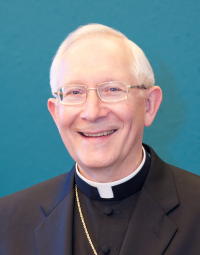
Archbishop Leonard P. Blair
During this month of May dedicated to the Blessed Virgin Mary, I would like to reflect a bit on her “yes” to God at the Annunciation, when the angel Gabriel appeared to her with the message that she was to conceive and bear a son. Mary’s “yes” is the most important and decisive answer ever uttered by one of God’s creatures for as long as time shall last. Without her womanly “yes,”there could be no conception and birth of the eternal Word, no fulfillment of God’s plan for our redemption.
You and I are caught up in the “yes” that Mary gave. Not only do we reap the benefits of her answer, but we, too, have to say “yes.” Scripture tells us that the whole human race was created to be married to God. The distinction between male and female, and their union in marriage, is as St. Paul says in his Letter to the Ephesians a sacrament of Christ’s love for his bride, the Church.
In his apostolic letter Mulieris Dignitatem, Pope St. John Paul II says that the spousal love of God makes each of us a bride of Christ.The pope writes: “[All] human beings both women and men are called through the Church to be the ‘bride’ of Christ, the Redeemer of the world. In this way, ‘being the bride,’ and thus the ‘feminine’ element, becomes a symbol of all that is ‘human.’ …In the Church, every human being male and female is the ‘bride,’ in that he or she accepts the gift of love of Christ the Redeemer, and seeks to respond to it with the gift of his or her own person.” (no. 25)
What the late pope is saying is that because our relationship to God, individually and as a Church, is nuptial, our “yes” has to be a total “yes.” It’s not enough to say “yes” in our mind or merely on our lips. You can imagine how short-lived a human marriage would be if the “I do” were only a matter of words. Our “yes” to God and to his plan must be a total gift as in marriage, a total gift of self like Mary’s body, soul and spirit. First, we accept the love of Christ the bridegroom, and then we reciprocate with our own gift of self to him.
But what does our “yes” entail? Obviously, we say “yes” to the gift of life, “yes” to God in Christ, “yes” to our Catholic faith, to what the Church believes and teaches. If we were baptized as infants as most of us were it was our parents and godparents who first said “yes” for us. As we grow up, we have to learn to make that baptismal “yes” our own.
Our “yes” to God only becomes fully mature when we understand, like Mary, that what God wants of us is intensely personal. Each of us has a unique vocation and mission from him: a vocation and mission to be someone and to accomplish something in this world. What God wants is our “yes” to the vocation and mission he wills for our salvation and our part in the salvation of the world.
You might think of it this way: What we are saying “yes” to is God’s “holiness plan” for us his personalized, unique vocation and mission plan for us. We have no way to know from day to day what life will bring. Just as Mary, on the day of the Annunciation, could not possibly have known what lay in store for her. Yet in faith she said “yes,” and we have to do the same.
And when we realize that, then we begin to understand what true holiness is. Holiness has been defined as that attribute of a person who allows himself or herself to be perfected by God, who cooperates with God, who says “yes” to God. And when we do that, we fulfill the purpose for which we were created; namely, the perfection of charity love of God and neighbor beginning on earth and fulfilled in heaven.
May each of us find in Mary the inspiration and strength we need to commit ourselves entirely to God’s hands in this way.
